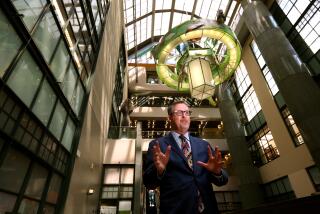The Age of the Surprising Superlibrary
- Share via
Democrats and Republicans alike are optimistic about the electronic storage and exchange of information. The Democrats talk about the “information superhighway.” One Republican leader mused publicly about actually giving away laptop computers.
The new technology excites virtually everyone who gets close to it. Unfortunately, increased access to information for some could be matched in this new Information Age by decreased access for others. Not everyone can afford a computer, and, time being money, many who can buy the hardware cannot buy the time needed to master the software.
Where, in this technological era, is the public servant who can function the way the reference librarian once functioned? In an American public library system unique in the world, perhaps the single most striking feature has been the availability of information consultants, the librarians themselves, paid for by the state and serving the public. Knowledge is power, and American democracy, trusting the people, has been willing to provide them with that power. Still, as technology for the storage and exchange of information evolves, where is the public consultant who, like the kindly and knowledgeable consultant at the reference desk of old, can direct the questioner to the “shelf” where the answer awaits?
The answer is obvious. That public consultant is the librarian. Librarians are Internet veterans. They had e-mail addresses before the public at large had yet heard of such a thing. Though their network has received less publicity than many commercial on-line services, the librarians, in effect, got there first.
Early expertise explains why, in Maryland, libraries have been able to team up and provide an e-mail address to every patron who wants one, using in-library computers purchased for the purpose under a special pilot project. The libraries are not just providing the hardware. They are also, crucially, providing the expertise necessary to turn Internet “newbies” into cyberspace explorers.
All this takes money, of course, and Maryland’s wonderful experiment has an expiration date. Nationwide, the problem is that library funding has been handled at the local level. Library users have shown strong support for libraries. However, even the sturdiest local support cannot fund the full transition of the traditional library system into a high-tech provider of information. This challenge falls, not just by default but in principle, to the federal government, for it involves integrating the libraries of the country into a single vast library: superlibrary rather than superhighway.
Can it be done? We hope so, but everything depends on whether the likes of Al Gore and Newt Gingrich will back up their brave talk with a little brave action.
More to Read
Get the L.A. Times Politics newsletter
Deeply reported insights into legislation, politics and policy from Sacramento, Washington and beyond. In your inbox twice per week.
You may occasionally receive promotional content from the Los Angeles Times.








